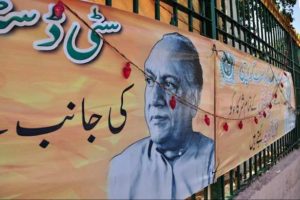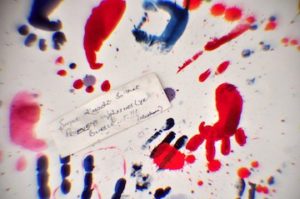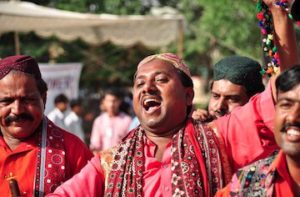Faiz Ahmed Faiz as a Symbol of Resistance
 Jashn-e-Faiz, organised by Citizens for Democracy (CFD) in collaboration with the Faiz Centennial Committee, National Academy for Performing Arts and the City of Karachi, was held on April 17. The event attracted crowds of students, activists and families, many of whom were there because they wanted to make a difference. It was clear that the approximately 30,000 people who showed up were driven by the event’s objectives: “to reclaim public space, promote religious harmony and counter extremist forces that have marginalised the constitutional rights of Pakistanis.” Advocate Aneela Malik, who works for the rights of children and labourers, said that she hopes good results will come out of events like these.
Jashn-e-Faiz, organised by Citizens for Democracy (CFD) in collaboration with the Faiz Centennial Committee, National Academy for Performing Arts and the City of Karachi, was held on April 17. The event attracted crowds of students, activists and families, many of whom were there because they wanted to make a difference. It was clear that the approximately 30,000 people who showed up were driven by the event’s objectives: “to reclaim public space, promote religious harmony and counter extremist forces that have marginalised the constitutional rights of Pakistanis.” Advocate Aneela Malik, who works for the rights of children and labourers, said that she hopes good results will come out of events like these.
The earlier part of the day had seminars on every topic from the war on terror to the effects of extremism on the working class. Manobhil, from Jamshoro, attended Sunday’s event and talked about a different type of problem: he has been fighting the case of the disappearance of his family at the hands of overlords. He said that he had gone on hunger strikes in Karachi, Lahore and Islamabad. When asked why he visits events like these, he said that maybe someone would listen if he gets the word out.
 The National Students Federation, which is spreading awareness about secularism and the importance of the separation of state and religion, held a seminar titled ‘Uncle Sam behind the Scenes.’ One of the speakers, Mujtaba Zaidi, member of the Central Coordination Committee of the NSF said that there are two currents in our society: firstly, that fundamentalism is a threat to American imperialism, and secondly, that imperialism is not the threat that it is made out to be. He believes that in the divided country of Pakistan there are those who label liberalism as a “virus” and then others who proclaim that many mullahs are the problem because of the “poison” of extremism that they propagate.
The National Students Federation, which is spreading awareness about secularism and the importance of the separation of state and religion, held a seminar titled ‘Uncle Sam behind the Scenes.’ One of the speakers, Mujtaba Zaidi, member of the Central Coordination Committee of the NSF said that there are two currents in our society: firstly, that fundamentalism is a threat to American imperialism, and secondly, that imperialism is not the threat that it is made out to be. He believes that in the divided country of Pakistan there are those who label liberalism as a “virus” and then others who proclaim that many mullahs are the problem because of the “poison” of extremism that they propagate.
Another seminar, ‘Tolerance vs Intolerance,’ included a discussion on the Charter for Compassion by educationist and scholar Abbas Hussain. Other speakers, who were there as audience members, also spoke. Justice Fakhuruddin G Ebrahim, ex-Governor of Sindh, quoted Senator Hasil Bizenjo (who spoke before him): “Let us not tolerate the intolerant.” He added that if people are just sensitive to the suffering of others and show compassion, we will become a tolerant nation.
‘Eco-Friendly Citizens,’ a seminar held in the Hamara Mahol (Our Environment) area, highlighted the importance of recycling and how anyone could make a difference. Shahid Mehmood of Khuda ki Basti talked about a recycling project that he had initiated amongst a community of 20,000 people in the suburbs of the city. He taught them how to separate organic and inorganic waste, make compost heaps and grow vegetables in urban spaces. “It took eight years for this project to take off,” he said. “The most important thing is to know how to mobilise a community and give them practical solutions for tackling environmental problems.”
 The event had a cross section of people, representative of the diversity of Pakistan. Kausar Malik is a volunteer teacher at the Labour Square Camp in Gulshan-e-Maymar. The camp is for flood victims. Only in her early 20s, she teaches English, Sindhi and math to students from grades one to five. A flood victim herself, she said that instead of doing nothing, she decided she could make a difference by teaching. “I like attending seminars,” she said. “They are great places to learn.”
The event had a cross section of people, representative of the diversity of Pakistan. Kausar Malik is a volunteer teacher at the Labour Square Camp in Gulshan-e-Maymar. The camp is for flood victims. Only in her early 20s, she teaches English, Sindhi and math to students from grades one to five. A flood victim herself, she said that instead of doing nothing, she decided she could make a difference by teaching. “I like attending seminars,” she said. “They are great places to learn.”
Shehzad Mazar, a medicine distributor for Saifrob Corporation, commented on the perceived artificiality of such events. He was of the view that involving political parties was the way to make a difference, not such “VIP” events. Others questioned the event itself and how Faiz’s name could be linked to such a diverse programme that had little to do with celebrating his work – not that tributes were not paid to him. But it seems they missed the point. “The idea was to create a space for all kinds of activities and to have free and open discourse,” said Farieha Aziz, a CFD activist and a member of the organising committee. “Faiz Ahmed Faiz was a symbol of resistance and the many activities yesterday — even people coming out of their homes — were acts of resistance against the rising extremism in society where we are forced into being suspicious of people, barricading ourselves from each other and living in fear and under threat.” And on that note, there were many people who deemed the event a success. Nehal Pervaiz, a mechanical engineer by profession is a dedicated enthusiast of Faiz Ahmed Faiz. He said that it is a sign of hope that there are so many people willing to make a change. “Just like a walk in the park is refreshing for the body, our minds took a walk of learning.”
Despite the kinks in the organisation and management of the large event — and there were several criticisms voiced about communications and programme timings — the energy of the young volunteers kept the event going. It was a hot afternoon, but Faiz’s message of “bol ke lab azaad hain tere, bol ke sach zinda hai ab tak” could be felt in everyone’s dedication.
Related links:
Read the resolution passed by the CFD at Jashn-e-Faiz.
For more information about the CFD and their work, visit their Facebook page, or the CFD website.
See Amima Sayeed’s photo album comprising vivid images of Jashn-e-Faiz.



